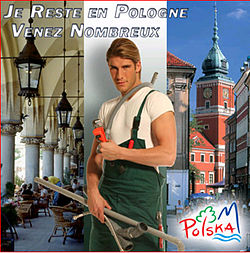| Revision as of 13:23, 31 December 2023 editEntranced98 (talk | contribs)Extended confirmed users, Pending changes reviewers, Rollbackers171,942 edits Adding short description: "Stereotype of Eastern Europeans"Tag: Shortdesc helper← Previous edit | Latest revision as of 20:07, 3 August 2024 edit undoGreenC bot (talk | contribs)Bots2,548,518 edits Move 1 url. Wayback Medic 2.5 per WP:URLREQ#nbcnews.com | ||
| Line 15: | Line 15: | ||
| ==Poster== | ==Poster== | ||
| A Polish tourism board used the stereotype in a humorous poster in 2005 inviting the French to come visit Poland.<ref>{{Cite news|url=http://news.bbc.co.uk/2/hi/europe/4115164.stm|title='Polish plumber' beckons French|date=2005-06-21|work=]|language=en-GB}}</ref><ref>{{Cite web|url= |
A Polish tourism board used the stereotype in a humorous poster in 2005 inviting the French to come visit Poland.<ref>{{Cite news|url=http://news.bbc.co.uk/2/hi/europe/4115164.stm|title='Polish plumber' beckons French|date=2005-06-21|work=]|language=en-GB}}</ref><ref>{{Cite web|url=https://www.nbcnews.com/id/wbna8396626|title=France's new media star? The Polish plumber.|date=2005-06-29|website=]|url-status=live|archive-url=https://web.archive.org/web/20160306082158/http://www.nbcnews.com/id/8396626/|archive-date=2016-03-06}}</ref> The designer of the poster was nominated in 2005 for the title "European of the Year" in category "Campaigner of the Year" <ref></ref> and the model, {{ill|Piotr Adamski|pl|Piotr Adamski (model)}} got his "]" and a brief career boost. <ref></ref> | ||
| ==Further reading== | ==Further reading== | ||
Latest revision as of 20:07, 3 August 2024
Stereotype of Eastern Europeans

The Polish plumber and the Polish builder are stereotypes of cheap labour coming from Central and Eastern Europe to work in Western Europe. They are both a symbol of the fear that cheap Eastern European labour is threatening the jobs of Western Europeans and a symbol of foreign labour being more affordable and reliable.
Origin
In 2004, a European Union law known as the Bolkestein Directive was drafted, which aimed at establishing a single market for services in the EU which would allow workers to move freely between countries of the European Union. The term "Polish plumber" was used in an article in Charlie Hebdo in 2004, but became popular after French politician Philippe de Villiers used it while campaigning against the EU law:
Cette affaire est très grave, car la directive Bolkestein permet à un plombier polonais ou à un architecte estonien de proposer ses services en France, au salaire et avec les règles de protection sociale de leur pays d'origine. Sur les 11 millions de personnes actives dans les services, un million d'emplois sont menacés par cette directive. Il s'agit d'un démantèlement de notre modèle économique et social "This matter is very serious as the Bolkenstein directive permits a Polish plumber or an Estonian architect to offer their services in France at the salary level and with the labor laws of their respective countries of origin. Of the 11 million people engaged in the service industry (in France), one million are threatened by this directive, which seeks to dismantle our economic and social model".— Philippe de Villiers.
In politics
The Swiss Socialist Party campaigned in favour of the free circulation of people (in the context of European bilateral deals) and also featured a character, with the slogan "Plumbers of all countries, unite!", a reference to the famous slogan from the Communist Manifesto.
An estimated two million workers from Eastern and Central Europe arrived in the United Kingdom between 2003 and 2007, half of them were Polish. The stereotype of the Polish plumber was cited as a factor in the referendum that led to the withdrawal of the United Kingdom from the European Union.
Poster
A Polish tourism board used the stereotype in a humorous poster in 2005 inviting the French to come visit Poland. The designer of the poster was nominated in 2005 for the title "European of the Year" in category "Campaigner of the Year" and the model, Piotr Adamski [pl] got his "15 minutes of fame" and a brief career boost.
Further reading
- Kończal, Kornelia (2008), Vom Schreckgespenst zum Dressman. Le plombier polonais und die Macht der Imagination, in: Kiran Klaus Patel, Veronika Lipphardt und Lorraine Bluche (ed.): Der Europäer – ein Konstrukt. Wissensbestände und Diskurse, Göttingen: Wallstein, p. 299–325.
See also
References
- ^ Quick, Vanessa (September 2007). "Beneficial immigration". The German Times. Archived from the original on 3 December 2013.
- "'Polish plumber' beckons French". BBC. 21 June 2005.
- "Comment le plombier polonais a fait voter "non" au référendum de 2005". L'Opinion (in French). 28 October 2013. Retrieved 1 November 2019.
- Décosse, Frédéric; Desalvo, Augustina (2017). "Les détachés de l'agriculture intensive". Plein Droit (in French). 113 (2): 7. doi:10.3917/pld.113.0007.
- Villiers : "La grande triche du oui", Interview de Philippe de Villiers, Le Figaro, 15 mars 2005
- "Libre circulation: Plombiers de tous les pays, unissez-vous!". Young Socialists Switzerland. 22 August 2005. Archived from the original on 16 May 2006.
- Adam Taylor (28 June 2016). "Britain's 850,000 Polish citizens face backlash after Brexit vote". Washington Post.
- Ted Jeory (24 June 2016). "Brexit: Polish builders defiant but admit future is 'uncertain' after EU referendum vote". Independent.
- Paola Buonadonna (3 June 2016). "First they came for the Polish plumbers: a dystopian view of life post-Brexit". The Daily Telegraph.
- Lauren Frayer (14 May 2016). "If Britain Leaves The EU, What Happens To The 'Polish Plumber?'". NPR.
- Elisabeth Braw (25 February 2016). "'Brexit' debate: Could Britain get by without the 'Polish Plumber'?". Christian Science Monitor.
- "'Polish plumber' beckons French". BBC. 21 June 2005.
- "France's new media star? The Polish plumber". NBC News. 29 June 2005. Archived from the original on 6 March 2016.
- "Andrzej Kozłowski nominowany na Europejczyka Roku!"
- "Polski hydraulik w Paryżu reklamuje uroki swego kraju"